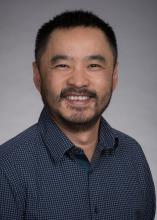Professor Xiaosong Li was awarded a 2020 University of Washington Distinguished Teaching Award as part of this year’s UW Awards of Excellence.
The Distinguished Teaching Award was established in 1970 and five are given annually to faculty members from the Seattle campus. A committee of faculty members, graduate students and staff educators appointed by the UW Center for Teaching & Learning selects recipients based on their mastery of the subject matter; enthusiasm and innovation in the teaching and learning process; ability to inspire independent and original thinking in students; innovations in course and curriculum design; and service as a mentor, collaborator and consultant to other faculty members and teaching assistants. Seattle faculty members who receive this award are inducted into the UW Teaching Academy, where they will be able to participate in a variety of Academy-sponsored projects and events to further excellence in the teaching and learning process at the UW.
Professor Li was recognized for his instructional efforts in Introductory General Chemistry (CHEM 142), Accelerated General Chemistry (CHEM 143), Quantum Chemistry & Spectroscopy (CHEM 455), and Computational Chemistry (CHEM 465/565), which he has taught over nearly fifteen years (and more than 20,000 student credit hours). One of our largest courses, CHEM 142 is often taken by students in their first quarter at the UW. It can be a tricky course to teach, as students come from a broad range of backgrounds and abilities, and they are undergoing a rapid adjustment to undergraduate life and new academic expectations. His students note that he creates a “rich, positive, and encouraging learning environment,” using various teaching methods to further student understanding of the course content, such as interactive lectures and in-class demonstrations to illustrate textbook concepts that may be difficult to grasp simply through reading. Students appreciate the level of challenge that he presents to them beyond the lectures, by incorporating a wide array of complex practice problems and then also teaching them important problem-solving techniques.
For CHEM 465/565, he developed a completely new curriculum in computational chemistry that integrates fundamental quantum chemical concepts with modern computational tools. Students receive an introduction to cutting-edge “chemistry by computational design” that aims to bridge the critical educational gap between classroom education in computational chemistry and the scientific skills needed for industrial, technical, and research jobs. Professor Li allows students to make the class their own, by having them come up with a project to pursue their research interests at the intersection of computers and chemistry (e.g., an organic chemist might simulate a reaction they had performed in lab, while a physical chemist might compute a spectrum to verify their own experimental interpretation). Though more labor intensive, as it requires the instructor to provide guidance on numerous individual projects that require different methods and approaches, students experience greater engagement, gain practical skills that will support their research interests, and feel confidence in their theoretical results given their knowledge of the underlying formalism.
In addition to his instructional efforts, Professor Li serves as co-Associate Chair of Graduate Education, with a focus on admissions and recruiting. He was also the leading force behind the Master of Science in Applied Chemical Science & Technology (MSACST), a new degree program to address real-world problem solving and scientific discovery by leveraging advanced tools in chemical science and technology.
For more information about Professor Li and his research program, please visit his faculty page and research group site.
